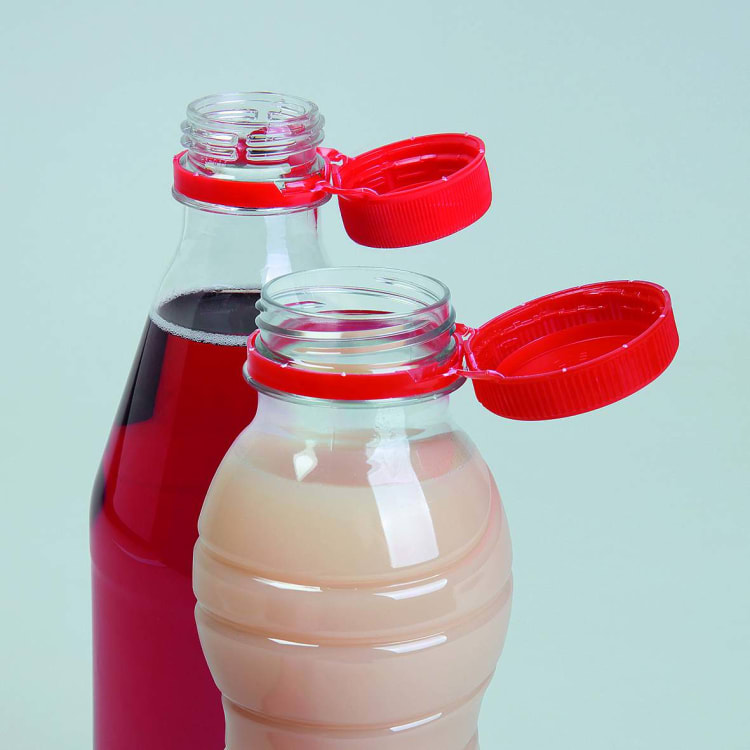Flexible response to demands
Regarding the packaging of their products, bottling companies today face multiple challenges, both economic and ecological. On the one hand, they are subject to pressure from growing time constraints and rising costs, on the other hand, the beverages industry is under scrutiny from the legislature right now – especially regarding recycling quotas and carbon emissions. Considering these developments, interpack exhibitor KHS is offering their customers a large portfolio of adjustable block solutions, especially for filling PET bottles, among them a new, modular platform that can be customised and expanded. First used for filling glass bottles in 2020, the machines now also fulfil customer wishes for adaptability and a guaranteed future when it comes to plastic bottles. “Nobody can say which trends the industry will follow in five years”, says Manfred Härtel, Product Manager Filling at KHS. “This is the reason we made our platform modular, so it can be fitted any time for different drinks or PET containers, depending on the demands of the market.” This way, additional individual components can be bought at a later time and integrated into existing solutions with a minimum of effort. In addition, many improvements in construction already help to save energy. The new filler allows filling temperatures to rise to 24 degrees Celsius, which lowers the investment and maintenance costs for energy-intensive cooling technology. At these temperatures there is also no condensation of water, which would have to be dried using a lot of energy before further packaging in foil or cardboard.
“Tethered Caps” soon to be mandatory
Caps and valves are often a problem when it comes to littering and the recycling of plastic bottles. EU legislation is therefore making the use of closures that are permanently connected to the bottle mandatory from 2024. Many manufacturers have already reacted and developed so-called “Tethered Caps”. Earlier than necessary, manufacturers of beverages are already following the EU guideline, among them Coca-Cola: The corporation already introduced their attached caps in 2021, and has been expanding them to an increasing number of PET single use bottles. Little has changed for consumers: The opening mechanism is the same, and the cap which is now attached to a safety ring can still be moved round the neck of the bottle as desired or secured in a specific position. By January 2024, the beverage corporation aims to have successively converted all its German plants. At the end of 2021, the bottling plant in Dorsten, North Rhine-Westphalia, was the first to make the change.
Manufacturers assume that the new caps will only resonate well with consumers if the handling is right. Consumer studies reveal that a “Tethered Cap” by interpack exhibitor Bericap did well because of its intuitive handling, the 180-degree-opening and its hygienic advantages. An early switch to “Tethered Caps” can allow beverage companies to increase the attractiveness of their products in the market.

The ClipAside Tethered Caps connected to the beverage bottle already fulfil the requirements of the EU Guideline 2019/904 for better recycling. © Bericap
Intelligent caps
Freshness indicators are helpful for the beverages sector as well. United Caps and the start-up Mimica have marketed a clever cap solution that includes a freshness indicator. The “Touchcap” changes its surface from even to uneven when a product is no longer fit for consumption. This is possible thanks to a gel in a special label that can change its structure. The cap can be recycled and consists of a lid base and a closing cap. After filling, this is mounted by a specialised machine that, like other modules – for example for labelling or stretch wrapping - can be seamlessly integrated into production. It is the consumer who activates the effect by opening the lid for the first time by twisting the cap. Currently, there is a pilot project in the UK with an orange juice brand.
Which other sustainable and innovative solutions the beverage industry will present will be revealed at interpack. From 4 to 10 May 2023, the exhibitors of the world's leading trade fair for processing & packaging in Düsseldorf will present their newest developments along the entire value chain - from machines, systems and packaging options to materials and recycling. In hall 13 there is a special focus on bottling and packaging solutions for the beverages sector. Further information on interpack is available at www.interpack.com
Teaser: Copyright: Messe Düsseldorf/C.Tillmann


